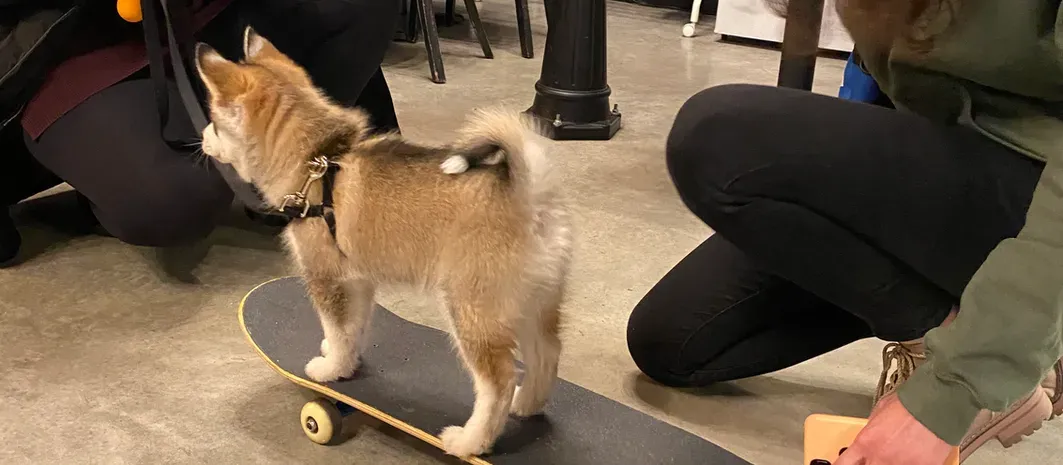
To Puppy Class, Or Not To Puppy Class
To Puppy Class, Or Not To Puppy Class
You recently adopted a new puppy and now you are looking into your options for training. There are hundreds of books (including mine) available online, and there are thousands of hours of videos on Youtube. Puppyhood seems to be going smoothly, puppy has learned the basic skills with you and listens really well. They follow you when outside and never wander too far. So the question is:
Do you really need that puppy class?


It's not a surprise to me that puppy class is harder to fill than my other classes. For many, it seems unnecessary. Puppy is perfect and training can be expensive. Plus, there's Youtube. You may even think to yourself that you don't need your dog to learn all these "tricks". But I promise, puppy class is so much more than that.
It is an opportunity to socialize your new companion in a safe and supervised environment. Something your local dog park can't do for you. Something that you can observe in a tutorial video but harder to figure out in real life without some guidance from a professional.
It's so more than just playing with other dogs. Though, that is a big part of it. Puppy class is more prevention than anything else. Prevention of:
Fear of strangers
Fear of other dogs
Fear of new sounds
Fear of new objects
Fear of new experiences
Resource guarding
Issues with grooming and vet visits
Preventing fear and aggression is so much easier than treating it.
It allows us to be proactive in helping our puppy build their life skills, their social skills and confidence in new experiences. Any good puppy class will include the following:
Off leash play: separating puppies depending on play style, and size. Providing shy puppies with a safe space to observe, instructors will coach guardians to create positive associations and encourage curiosity
Obstacle course including different objects, surfaces and textures
Body handling exercises for grooming and vet care
Resource guarding prevention exercises
Discussions on normal dog behaviours and how to manage/handle them
Basic life skills such as walking on leash, coming when called, and impulse control (leave it for food for example)
And use only positive reinforcement training methods
The life skills you teach your puppy should help serve you and your puppy. They should be taught in a way that makes life together go more smoothly. As an example, we teach puppies "leave it" in class, but by the 3rd class we are using it for walks, paper towels, socks and other "illegal" objects. Coming when called is practiced with low level distractions at the first class and by the last class, we are using it during play and around heavy food distractions.
Why I do this? I want these skills will work for you when you leave class, when you most need it. I want to equip my students with life skills that they can come away with and use for the rest of their puppy's life. If you do only one training class, I want it to be my puppy class.
Are there wrong ways to do a puppy class? Certainly. Not touching upon body handling or resource guarding is such a disservice to dogs. We don't truly realize how much we need it until we do. For example, imagine never really playing with your dogs ears, or making positive associations to being handled. One day, your dog gets an ear infection that is uncomfortable and painful. You now need to put drops in their ears and clean away debris. We shouldn't be surprised that they are not handling this well. But that's what puppy class is for, to help prepare your puppy for the eventual need to give them vet care.
I also teach how to read your dog's body language, an invaluable skill that dogs so desperately need us to learn. This helps us when we socialize, to make sure puppy is having a good time. Understanding when our pup is stressed will help us from installing fear in them, unknowingly. You can go forward with confidence on better understanding your puppy and making them feel better.
A point I think is worth mentioning is this, it's not "all in how they are raised", as we often hear. I have clients who have done everything right and their puppy still grows up to be nervous or reactive. This is because genetics (the character of your puppy's mom and dad), play a huge role in how they develop. Socialization provides us with an opportunity to make the most of this curious and explorative developmental period our puppies have. It allows us to install good cooping mechanisms, positive experiences and important life skills to help them handle life as an adult.
Again, if you do only one training class with your puppy, let it be puppy class.
If you are in need of more guidance with your puppy, book a virtual consult here.
Extra resources: